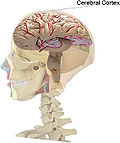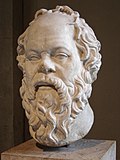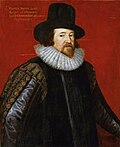Inductive reasoning refers to a variety of methods of reasoning in which the conclusion of an argument is supported not with deductive certainty, but...
67 KB (8,642 words) - 14:31, 26 May 2025
Inductive reasoning aptitude (also called differentiation or inductive learning ability) measures how well a person can identify a pattern within a large...
2 KB (331 words) - 07:05, 3 May 2025
formalized in the same language called the Calculus of Inductive Constructions (CIC). Automated reasoning has been most commonly used to build automated theorem...
14 KB (1,399 words) - 16:29, 2 June 2025
includes forms of non-deductive reasoning, such as inductive, abductive, and analogical reasoning. The forms of logical reasoning have in common that they use...
70 KB (7,326 words) - 13:12, 2 June 2025
Although reasoning systems widely support deductive inference, some systems employ abductive, inductive, defeasible and other types of reasoning. Heuristics...
17 KB (1,945 words) - 09:52, 25 May 2025
Problem of induction (redirect from Inductive skepticism)
consequences, and then empirically attempting to falsify them. In inductive reasoning, one makes a series of observations and infers a claim based on them...
33 KB (4,423 words) - 23:32, 30 May 2025
conclusion. Deductive reasoning contrasts with non-deductive or ampliative reasoning. For ampliative arguments, such as inductive or abductive arguments...
70 KB (8,482 words) - 14:47, 23 May 2025
Scientific inquiry includes creating a testable hypothesis through inductive reasoning, testing it through experiments and statistical analysis, and adjusting...
198 KB (23,335 words) - 05:10, 31 May 2025
Appeal to the stone (section Inductive reasoning)
means that it relies on inductive reasoning in an argument to justify an assertion. Informal fallacies contain erroneous reasoning in content of the argument...
21 KB (2,324 words) - 22:21, 22 May 2025
expressed in terms such as "best available" or "most likely". While inductive reasoning draws general conclusions that apply to many situations, abductive...
76 KB (9,972 words) - 08:17, 24 May 2025
Analytical skill (section Inductive Reasoning)
sub-classifications in deductive reasoning, inductive reasoning and abductive reasoning. ‘Deductive reasoning is a basic form of valid reasoning, commencing with a...
35 KB (3,837 words) - 23:41, 20 December 2024
based on those laws. The laws of nature are arrived at through inductive reasoning. David Hume's problem of induction demonstrates that one must appeal...
5 KB (586 words) - 17:05, 24 April 2025
Inductive probability attempts to give the probability of future events based on past events. It is the basis for inductive reasoning, and gives the mathematical...
43 KB (8,027 words) - 03:30, 19 July 2024
Logic (redirect from Science of correct reasoning)
support to their conclusions. For such cases, the term ampliative or inductive reasoning is used. Deductive arguments are associated with formal logic in...
145 KB (16,460 words) - 07:34, 3 June 2025
Solomonoff's theory of inductive inference proves that, under its common sense assumptions (axioms), the best possible scientific model is the shortest...
17 KB (2,113 words) - 10:09, 27 May 2025
Models of scientific inquiry (redirect from Scientific reasoning)
exact reasoning, set out the threefold scheme of abductive, deductive, and inductive inference, and also treated the compound forms such as reasoning by...
25 KB (3,259 words) - 14:52, 27 March 2025
Syllogism (redirect from Syllogistic reasoning)
historical deductive reasoning, whereby facts are determined by combining existing statements, in contrast to inductive reasoning, in which facts are predicted...
45 KB (5,126 words) - 07:19, 7 May 2025
requires inductive reasoning to arrive at the premises for the principle of inductive reasoning, and therefore the justification for inductive reasoning is...
53 KB (6,689 words) - 06:34, 26 May 2025
A Treatise of Human Nature (redirect from A Treatise of Human Nature: Being an Attempt to introduce the experimental Method of Reasoning into Moral Subjects)
behaviour. He introduces the famous problem of induction, arguing that inductive reasoning and our beliefs regarding cause and effect cannot be justified by...
117 KB (17,459 words) - 07:02, 31 May 2025
Wechsler Adult Intelligence Scale (redirect from Perceptual Reasoning Index)
Perceptual Reasoning Index has been split into Visual Spatial Ability (Block Design, Visual Puzzles) and Fluid Reasoning (Matrix Reasoning, Figure Weights)...
26 KB (2,679 words) - 15:28, 26 May 2025
exhaustive deductive reasoning that establish logical certainty, to be distinguished from empirical arguments or non-exhaustive inductive reasoning that establish...
34 KB (4,229 words) - 11:05, 26 May 2025
Scientists use inductive reasoning to create theories and hypotheses. Philip Johnson-Laird distinguished inductive from deductive reasoning, in that the...
27 KB (3,660 words) - 06:13, 19 March 2024
Mathematical induction (redirect from Inductive hypothesis)
Despite its name, mathematical induction differs fundamentally from inductive reasoning as used in philosophy, in which the examination of many cases results...
47 KB (6,914 words) - 08:02, 15 April 2025
Statistical inference (redirect from Inductive strength)
assumption for covariate information. Objective randomization allows properly inductive procedures. Many statisticians prefer randomization-based analysis of...
47 KB (5,519 words) - 22:27, 10 May 2025
Probabilistic logic (redirect from Probabilistic reasoning)
classic probability theory and first-order logic that is suitable for inductive reasoning. Their theory assigns probabilities or degrees of beliefs to sentences...
17 KB (2,003 words) - 20:46, 20 May 2025
Mesopotamia to be the source rather than Egypt. Culture history uses inductive reasoning unlike its main rival, processual archaeology which stresses the...
21 KB (2,631 words) - 19:30, 27 January 2025
Motivated reasoning is the mental process that include mechanisms for accessing, constructing, and evaluating beliefs in response to new information or...
40 KB (4,717 words) - 17:43, 28 May 2025
argued for the possibility of scientific knowledge based only upon inductive reasoning and careful observation of events in nature. He believed that science...
94 KB (10,783 words) - 14:05, 29 May 2025












